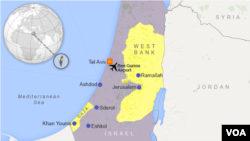The U.S. Federal Aviation Administration has lifted a ban on U.S. airlines flying in and out of Israel's Ben Gurion Airport, while continued fighting pushed the Palestinian death toll over 700.
A truce remained elusive despite intensive mediation efforts. Israel said it needs more time to eradicate rocket stocks and cross-border tunnels in the Gaza Strip and Hamas Islamists demand the blockade on the enclave be lifted.
An Egyptian official said on Wednesday that a more limited humanitarian cease-fire may go into effect by the weekend, in time for the Eid al-Fitr festival, Islam's biggest annual celebration that follows the fasting month of Ramadan.
But the United States, whose Secretary of State John Kerry is spearheading the indirect negotiations, was more circumspect.
“It would not be accurate to say that we expect a cease-fire by the weekend,” said a senior U.S. official, who spoke on condition of anonymity. “We are continuing to work on it, but it is not set at this point.”
'Fluid situation'
The FAA said late Wednesday it canceled the restrictions after looking at new information and steps Israel is taking to lessen the risks to passenger planes.
The flight ban went into place Tuesday after rocket fire from Gaza hit near the airport outside Tel Aviv.
An FAA statement said it will continue to monitor what it calls a "very fluid situation" around the airport and will take additional actions if necessary.
U.S. State Department spokeswoman Marie Harf acknowledged Wednesday that Hamas has rockets that could reach Ben Gurion airport, but the accuracy of those weapons is limited.
Israel predicted take-offs and landings by U.S. carriers would resume on Thursday though European airlines might take longer to follow suit.
“The Europeans did not really deliberate over this, but acted more as a follow-up to the American decision,” said Gadi Regev, chief of staff for Israel's Civil Aviation Authority.
Death toll
The death toll in Gaza rose above 700 on Thursday as Israeli tank fire before dawn killed 16 people in the Hamas-dominated coastal territory, including six members of the same family, Palestinian health officials said.
Israel has lost 32 soldiers to clashes inside Gaza and with Hamas raiders who have slipped across the fortified frontier in tunnels.
Rocket and mortar shelling by Hamas and other Palestinian guerrillas has killed three civilians in Israel.
Such shelling surged last month as Israel cracked down on Hamas in the occupied West Bank, triggering the July 8 air and sea barrage in Gaza that escalated into an invasion a week ago.
Though Israel's Iron Dome rocket interceptor has shot down most of the rockets fired from Gaza, one that came close to Tel Aviv's Ben Gurion Airport on Tuesday prompted the U.S. Federal Aviation Administration (FAA) to bar American flights there.
The ensuing wave of cancelations by foreign airlines emptied Israel's usually bustling international gateway and hurt its hi-tech economy at the height of summer tourist season. It was hailed as a “victory” by Hamas, and prompted an appeal by Israeli Prime Minister Benjamin Netanyahu on Kerry to intervene.
In what appeared to be a let-up in Palestinian attacks, the Israeli military said on Thursday only one rocket had been launched from Gaza overnight. It fell wide, causing no damage.
Cease-fire negotiations
Israel's security cabinet met late into the night on a proposed humanitarian truce under which fighting would cease immediately, but negotiations for terms for an extended deal would begin only in several days' time.
The cabinet's Science Minister Yaakov Peri Gaza said on Thursday a truce involving a withdrawal of Israeli ground forces from the Palestinian territory would be unlikely before next week.
“I do not see a ceasefire in the coming days where the IDF (Israel Defence Forces) leave,” Peri, a former security chief, told the Walla news site, adding that troops needed more time to complete their mission of destroying cross-border tunnels used by Gaza guerrillas.
“I can say authoritatively that two or three days will not be enough to finish tackling the tunnels," Peri said.
Hamas leader Khaled Meshaal said his fighters had made gains against Israel and voiced support for a humanitarian truce, but only if Israel eased restrictions on Gaza's 1.8 million Palestinians, who are also under an embargo by next-door Egypt.
“Let's agree first on the demands and on implementing them and then we can agree on the zero hour for a ceasefire. ... We will not accept any proposal that does not lift the blockade. ... We do not desire war and we do not want it to continue but we will not be broken by it,” Meshaal said on Wednesday in Qatar.
Israel also came under criticism from the U.N. High Commissioner for Human Rights Navi Pillay, who said there was “a strong possibility” Israel was committing war crimes in Gaza, where 703 Palestinians, mostly civilians, have been killed in the fighting.
Pillay also condemned indiscriminate Islamist rocket fire out of Gaza, and the United Nations Human Rights Council said it would launch an international inquiry into alleged violations.
Israeli Prime Minister Benjamin Netanyahu reacted furiously.
“The decision today by the HRC is a travesty,” he said in a statement. “The HRC should be launching an investigation into Hamas's decision to turn hospitals into military command centers, use schools as weapons depots and place missile batteries next to playgrounds, private homes and mosques.”
Rockets in school
U.N. Secretary-General Ban Ki-moon, who has also been on a truce-seeking mission, lashed out at militants in Gaza by expressing “outrage and regret” at rockets found inside a U.N. school for refugees, for the second time during the conflict.
Storing the rockets in the schools “turned schools into potentially military targets, endangering the lives of innocent children,” U.N. employees and the tens of thousands of Palestinians seeking shelter at Gaza schools from the fighting, Ban said. He urged an investigation.
Kerry returned to Egypt late on Wednesday after meeting in Jerusalem and the West Bank with Palestinian President Mahmoud Abbas, Ban and a grim-faced Netanyahu.
“We have certainly made some steps forward. There is still work to be done,” said Kerry, on one of his most intensive regional visits since Netanyahu called off U.S.-sponsored peace negotiations over Abbas's power-share deal with Hamas in April.
The military says one of its soldiers is also missing and believes he might be dead. Hamas says it has captured him, but has not released a picture of him in their hands.
Gaza has been rocked by regular bouts of violence since Israel unilaterally pulled out of the territory in 2005.
Hamas, which rejects Israel's right to exist, balked at Egypt's proposal for an unconditional truce, saying its conditions had to be met in full before any end to the conflict.
The war is exacting a heavy toll on impoverished Gaza. Palestinian officials say at least 475 houses have been destroyed by Israeli fire and 2,644 damaged. Some 46 schools, 56 mosques and seven hospitals have also suffered varying degrees of destruction.
Some information for this report provided by Reuters.







